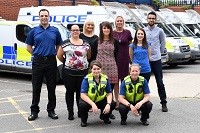Luton community safety partnership

The Community Safety Partnership publishes an annually updated Partnership Plan, which can be found on the Community Safety Partnership plan webpage.
Luton's Community Safety Partnership was formerly known as the Crime and Disorder Reduction Partnership.
The partnership acts as an umbrella under which various organisations including the council, Police, Clinical Commissioning Group, Probation and Fire and Rescue services work together to address:
- crime
- anti-social behaviour (ASB)
- drug and alcohol problems
- (re)offending behaviour
The partnership recognises that a long term commitment to tackling issues faced in Luton is required and has committed to the following priorities for 2017 to 2020:
Reducing violence and exploitation
- youth violence
- domestic abuse
- labour exploitation
- tackling extremism
- child and adult sexual exploitation
BAVEX - Bedfordshire Against Violence and Exploitation
BAVEX is a Bedfordshire campaign, raising awareness and responding to the themes of exploitation including:
- sexual exploitation
- child exploitation (both sexual and criminal)
- criminal exploitation
- labour Exploitation
- cuckooing
We're not only responsible for working with partners to identify victims of exploitation, but also the safeguarding and operation response to disrupting and preventing this form of abuse.
Here are some case studies which have been anonymised.
X will be used instead of the individuals name within the case study.
X used to reside at property that was linked to antisocial behaviour (ASB), which was subject to enforcement action due to ongoing complaints of verbal abuse, drug dealing and intimidation at the address. X was not registered to live at this address, but was seen there from time to time.
X used to provide support and company to the tenant at the address and help with domestic chores.
A call was made to 101 to say there was a domestic incident at the address.
The attending officer who had been involved in the ASB investigation went into X’s room. The room was unliveable - there was a filthy dirty mattress on a broken bed - with no linen, and sparse furniture. X’s belongings lived in a bin liner on the floor.
There were dogs at the address which shared X’s bed.
X was very distressed and confused when the officers attended.
One of the perpetrators kept telling X to be quiet when professionals visited unannounced, and when there were official visits scheduled X was often hidden away from professionals or ‘watched’ as to what was being disclosed.
X was removed from the address and put into a safe location, after a rapport had been built up with X he started making disclosures about the abuse he was subjected to whilst living at the address.
An National Referral Mechanism (NRM – which is the national support referral for victims of modern day slavery) was completed, professionals meetings were held, safeguarding alerts made and regular visits from case officer.
X reported that someone was claiming benefits to be his carer, but provided no care to X. X disclosed how they took X’s money and how X was housed there, only to carry out jobs such as cleaning up after the dogs. X struggled to read or write.
X’s family were discouraged from visiting. X is a very vulnerable person with severe MH issues.
A after a lot of support from LBC and Police, X was placed in supported living, X is now thriving and away from the abuse and exploitation.
Cuckooing is a term used when someone’s property has been taken over, by other individuals for the purpose of criminality.
Z will be used instead of this victims name in this case study.
Earlier this year the Community Policing team were conducting routine patrols in Luton, when they observed known individuals, who had previously been linked to drug activity and suspected cuckooing, frequenting Z’s home address.
Police completed a referral to the Luton Cuckooing Panel, which is made up of partners from Luton Council, Bedfordshire Policing, Housing, Drug & Alcohol support services, Social Care, Mental Health services and a number of other agencies.
The panel meet once a month to discuss risks and concerns in relation to Cuckooing, developing action plans to minimise risk and resolve the concerns.
On receipt of the referral, checks were completed and it was discovered that Z was a vulnerable male, who lived alone, had physical health conditions and had previous drug related issues.
Z was already receiving one-to-one support by an outreach worker, who was able to speak to Z about the concerns that had been raised about the visitors to Z’s property.
Z disclosed that people had been visiting and staying at the address and at times, Z did not want them there but felt unable to make them leave due to his current health needs.
Z further advised that money and other belonging had been taken from him and that there was activity occurring, that Z was worried would jeopardise his tenancy.
Police continued to patrol and monitor the location, numerous visits were done by Housing, Social Care and the Cuckooing panel representatives, to provide support to Z and disrupt the activity taking place.
Z was provided a new mobile phone, as he had reported his being taken. Home improvements were carried out in Z’s property, to assist with making him safer within his own home.
Z has reported that he has had no further issues with these people coming to his address and that he is finally able to focus on his physical recovery. Z continues to receive regular support from his key worker and is engaging well with the resoLUTiONs.
Keeping Luton safe and tidy
- anti social behaviour
- environmental crime
- street sex trade
- confident, cohesive communities (including hate crime)
Follow this link to find out more about the crime picture in Luton.
Luton Borough Council, Town Hall, George Street, Luton, Bedfordshire, LU1 2BQ
Tel: 01582 546106
[email protected]
 1.3 MB
1.3 MB